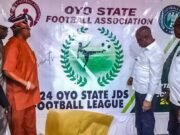“Leaders become great, not because of their power, but because of their ability to empower others” — John Maxwell
I remember asking multiple people, across different demography and party lines, what they think about Governor Makinde’s investment in and empowerment of the youth in the last five years. Nearly all of them echoed similar responses: nothing significant and inspiring has been done by the Governor and his government. Not surprisingly, they all claimed that Makinde’s scorecard in terms of investing, empowering, and building the next generation of leaders through specially formulated policies and specifically targeted programs for young people has been abysmal.
Stumped and gob-smacked, I went on to probe about what they assume must have influenced such abysmal performance given the youthfulness of the Governor and the support he has garnered over the years, particularly in the last two general elections. Perhaps more curiously, I asked what they think must have informed the decision of the Kwara state Governor, a 64-year-old Abdulrahman Abdulrasaq to have absolute trust and faith in advancing the collective interests of the youth and women in decision-making positions through strategic appointments and recruitments into critical sectors of the state economy.
As a follow-up to my last column, I further pressed my respondents on whether Makinde’s popularity among young people especially on social media is hurting them – maybe the Governor only sees the young chaps as pawns in the game of chess. Granted, I was told that my hypothesis is partially right and that the sharp contrast between the trust most young people have in the Governor and the Governor’s clapback of distrust is a leadership dysfunction that will render whatever Makinde achieved in other sectors utterly incomplete in the grand scheme of things.
To cap it all, in last week’s edition of this column, I asked three vital and critical questions that are essential to understanding the efforts of Makinde’s government in youth empowerment and investment. First: How has Makinde’s government empowered the youth in the state? What has his government done differently in tackling youth restlessness and what legacy will he leave behind in terms of youth empowerment? Unlike my previous interventions on Makinde and youth that attracted opinions from different quarters, my last week’s content hasn’t been refuted by handlers of the government: an indication that the chicken must have finally come home to roast. The young people that have always been used for such hatchet jobs are no longer available. Or perhaps, they must have realized the danger of acting as digital dingbats to people who care little about them. What makes a great leader?
In Nigeria, we easily and happily mention the likes of Chief Obafemi Awolowo, Sir Ahmadu Bello and Dr. Nnamdi Azikwe as some of our greatest of all time. We reminisce about their times and wish they never died. Here in the West, the late sage, Obafemi Awolowo is believed to be the compass of an exceptional, excellent and enigmatic leader. Some of his footprints have become references to what is possible, achievable and doable both in infrastructure and human capacity development.
As the vanguard of many firsts, Awolowo still seems to be an exemplary leader who connected with the people remarkably. Up North, the story of the late Sardauna of Sokoto, Ahmadu Bello is the same as in the East. Dr. Azikwe among other leaders is still being revered for their ability to lead with purpose and build people ground up. We all admire resilient leaders, trustworthy, communicate clearly, have integrity personified and are fiercely passionate about empowering people. John Maxwell, leadership expert and award-winning author once remarked that leaders become great, not because of their power, but because of their ability to empower others.
What does it take to empower people? Are leaders who empower others born or made? Why is it so difficult for Governor Makinde to massively empower the next generation of leaders? Is he even conscious of posterity? Is he aware that in the long run, it is the people he builds that will matter more than roads and payment of salary to workers? But at the core of empowerment lies an important feature: mindset. To effectively empower others, having a growth mindset becomes inevitable. When leaders see others as partners in progress and not competitors that must be defeated, they set out to empower them.
And this all boils down to perspective. You may wonder: How on earth are we still referring to the likes of Chief Obafemi Awolowo anytime we discuss the Nigerian leadership crisis? It is because people like him were conscious of their place in history. They worked hard to etch their names in the book of history by working towards investing in infrastructure that will outlive them and in people who will carry their ideas and ideals long after they are gone. Brene Brown, one of my favourite authors noted that “a leader is anyone who takes responsibility for finding the potential in people and processes, and who dares to develop that potential.
Some leaders are wired to see others as potential threats. They are eternal pessimists and cynics. Whether young or old, they see anyone with a mind of their own as a danger that must be wiped out. In effect, such leaders will never blink twice in denying anyone the opportunity to rest on their shoulders. Isaac Newton once reflected that if he has seen farther than others, it is because he is standing on the shoulders of giants. Great leaders allow others to rest and stand on their wings. They see potential and go out of their way to offer bright and brilliant minds the space, place and resources to shine and fly high. Great leaders are also nurturers.
They are like farmers. They don’t joke with their plants. Deeply and profoundly, they tend their plants and ensure they are nourished to grow and blossom. They watch over their farms the same way a mother watches over her baby. Late Abiola Ajimobi might be criticized for many things but not his ability to discover talent and empower them to rise and shine in public service. Dr. Zacchaeus Adedeji Adelabu was 33 years old when he served as the commissioner for finance under Senator Abiola Ajimobi. He was a budding star with an impressive and intimidating CV. Today, he is the Executive Chairman of, the Federal Inland Revenue Service. Truly, Governor Makinde appointed a 27-year-old Seun Fakorede as commissioner for youths and sports in his first term but where is he? Gone with the wind?
Investing in and empowering the next generation of leaders is not only endearing, it is simply inevitable. Those who fail to empower the youth risk having all their sweat thrown into the waste bin of history. History will tell where Governor Seyi Makinde stands.
OYO101 is Muftau Gbadegesin’s opinion about issues affecting the Oyo state and is published every Saturday. He can be reached via @muftaugbade on X, muftaugbadegesin@gmail.com and 09065176850.
































